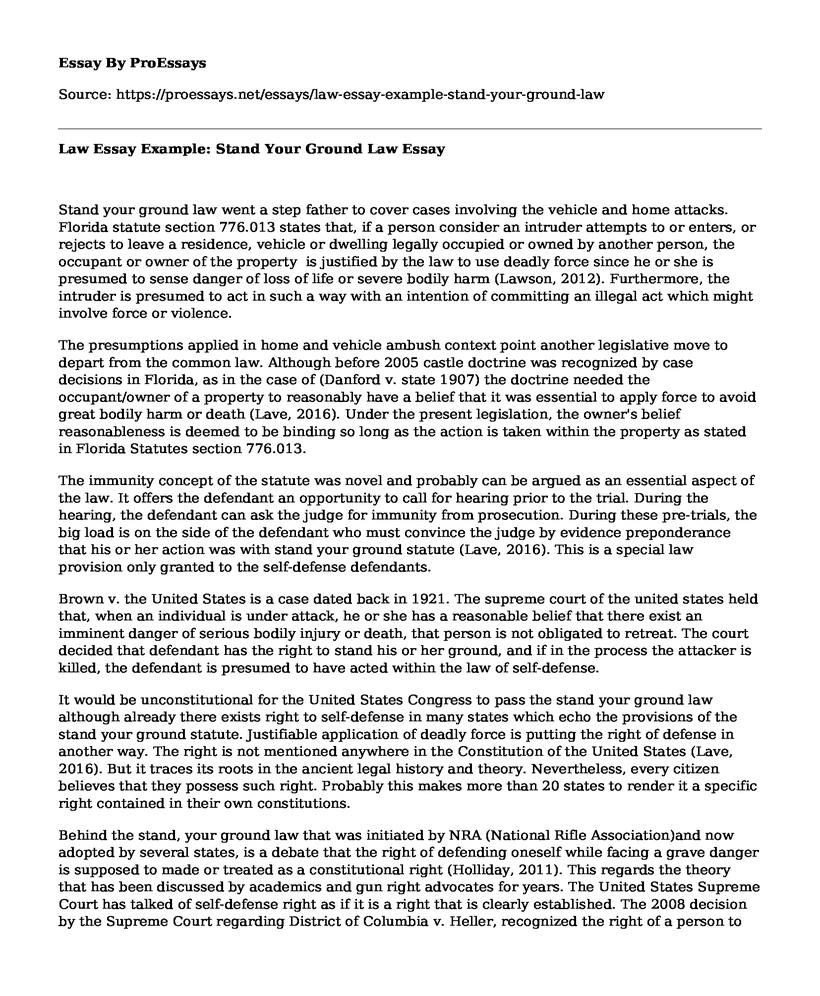Stand your ground law went a step father to cover cases involving the vehicle and home attacks. Florida statute section 776.013 states that, if a person consider an intruder attempts to or enters, or rejects to leave a residence, vehicle or dwelling legally occupied or owned by another person, the occupant or owner of the property is justified by the law to use deadly force since he or she is presumed to sense danger of loss of life or severe bodily harm (Lawson, 2012). Furthermore, the intruder is presumed to act in such a way with an intention of committing an illegal act which might involve force or violence.
The presumptions applied in home and vehicle ambush context point another legislative move to depart from the common law. Although before 2005 castle doctrine was recognized by case decisions in Florida, as in the case of (Danford v. state 1907) the doctrine needed the occupant/owner of a property to reasonably have a belief that it was essential to apply force to avoid great bodily harm or death (Lave, 2016). Under the present legislation, the owner's belief reasonableness is deemed to be binding so long as the action is taken within the property as stated in Florida Statutes section 776.013.
The immunity concept of the statute was novel and probably can be argued as an essential aspect of the law. It offers the defendant an opportunity to call for hearing prior to the trial. During the hearing, the defendant can ask the judge for immunity from prosecution. During these pre-trials, the big load is on the side of the defendant who must convince the judge by evidence preponderance that his or her action was with stand your ground statute (Lave, 2016). This is a special law provision only granted to the self-defense defendants.
Brown v. the United States is a case dated back in 1921. The supreme court of the united states held that, when an individual is under attack, he or she has a reasonable belief that there exist an imminent danger of serious bodily injury or death, that person is not obligated to retreat. The court decided that defendant has the right to stand his or her ground, and if in the process the attacker is killed, the defendant is presumed to have acted within the law of self-defense.
It would be unconstitutional for the United States Congress to pass the stand your ground law although already there exists right to self-defense in many states which echo the provisions of the stand your ground statute. Justifiable application of deadly force is putting the right of defense in another way. The right is not mentioned anywhere in the Constitution of the United States (Lave, 2016). But it traces its roots in the ancient legal history and theory. Nevertheless, every citizen believes that they possess such right. Probably this makes more than 20 states to render it a specific right contained in their own constitutions.
Behind the stand, your ground law that was initiated by NRA (National Rifle Association)and now adopted by several states, is a debate that the right of defending oneself while facing a grave danger is supposed to made or treated as a constitutional right (Holliday, 2011). This regards the theory that has been discussed by academics and gun right advocates for years. The United States Supreme Court has talked of self-defense right as if it is a right that is clearly established. The 2008 decision by the Supreme Court regarding District of Columbia v. Heller, recognized the right of a person to own a gun under the 2nd amendment. It stated that such kind of weapon ought to be used for ancient legal purpose within a persons home (Holliday, 2011).
To date, the stand your ground is a matter of state laws, but with time it might offer ways to execute the right throughout the nation if the self defense will finally become a guaranteed right in the United States Constitution. Otherwise, regarding collective US law, the statute is not constitutional.
References
Lawson, T. F. (2012). A fresh cut in an old wounda critical analysis of the Trayvon Martin killing: The public outcry, the prosecutors discretion, and the stand your ground law.
Weaver, Z. L. (2008). Florida's Stand Your Ground Law: The Actual Effects and the Need for Clarification. U. Miami L. Rev., 63, 395.
Lave, T. R. (2016). Shoot to Kill: A Critical Look at Stand Your Ground Laws. Browser Download This Paper.
Hundley, K., Martin, S. T., & Humburg, C. (2012). Florida stand your ground law yields some shocking outcomes depending on how law is applied. Tampa Bay Times, 1.
Holliday, W. (2011). The Answer to Criminal Aggression is Retaliation: Stand-Your-Ground Laws and the Liberalization of Self-Defense. U. Tol. L. Rev., 43, 407.
Cite this page
Law Essay Example: Stand Your Ground Law. (2021, Jun 25). Retrieved from https://proessays.net/essays/law-essay-example-stand-your-ground-law
If you are the original author of this essay and no longer wish to have it published on the ProEssays website, please click below to request its removal:
- Ethics of Police Deception During Interrogation Annotated Bibliography
- Essay on Voting Rights for Felons in Texas
- Essay Example on Crime: A Social Scourge That Needs to Be Addressed
- Paula v. Cash Mart & Geoffrey: Unlawful Detention & Possible Torts Claims - Case Study
- Essay on Digital Forensics Certifications: Meeting Society's Demand for Cybercrime Prevention
- Essay Example on Dream/Killer: True Story of Wrongful Conviction in 2015 Documentary
- Female Delinquency: Neglected & Different Development - Essay Sample







